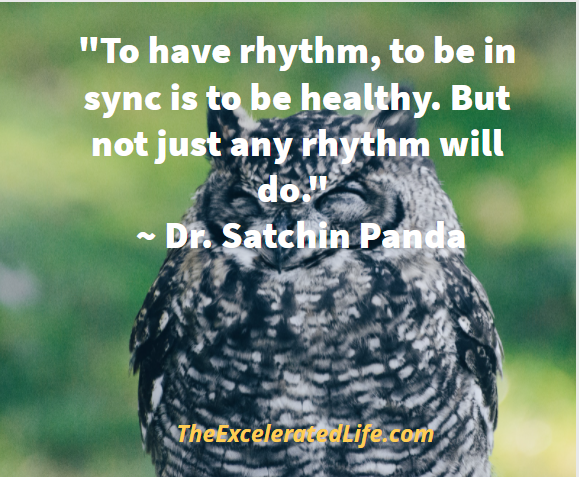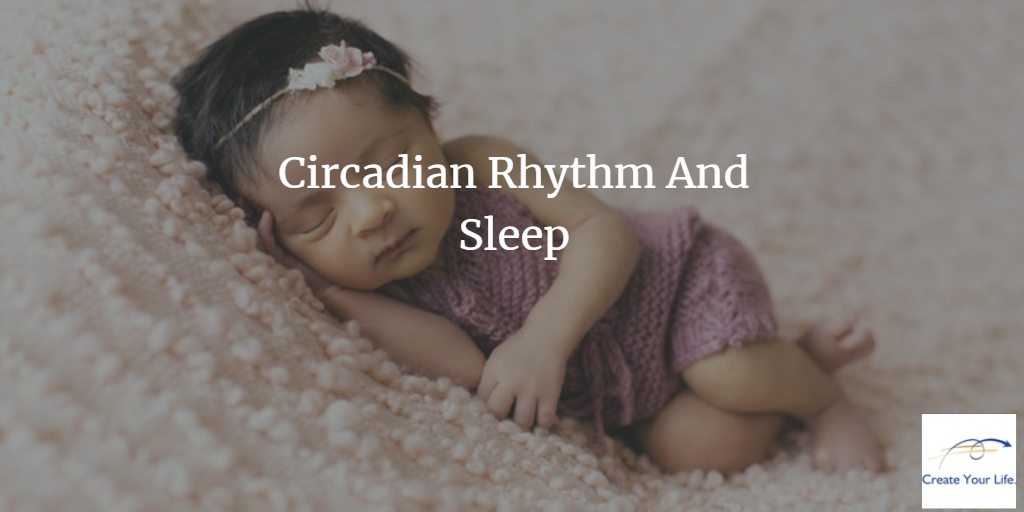Circadian rhythm is the biological clock that regulates our patterns of wakefulness and sleep. Various factors can affect when and how melatonin, the “sleep hormone”, is produced. By regulating the factors that influence our circadian rhythm, we can improve that fundamental aspect of good health: sleep.
TheExceleratedLife.com
Title Photo by SHAHBAZ AKRAM from Pexels
What Is Circadian Rhythm?
(And why should I care?)
The “circadian” in circadian rhythm comes from the Latin words circa meaning “about” and dies meaning “day”. Circadian rhythms are “physical, mental, and behavioral changes that follow a 24-hour cycle” [“Circadian Rhythms.”] . . . i.e., about a day. They influence going to sleep at night and being awake during daylight hours.
Circadian rhythm is controlled by a “biological clock” – “specific molecules (proteins) that interact with cells throughout the body. Nearly every tissue and organ contains biological clocks.” [“Circadian Rhythms.”] We are built to respond to a 24-hour rhythm of being awake and sleeping.
Our biological clocks are controlled by a structure called the “suprachiasmatic nucleus” or SCN. [“Circadian Rhythms.”] Here’s a really, really brief and simple description of how this works. “The SCN controls the production of melatonin, a hormone that makes you sleepy.” [“Circadian Rhythms.”] It does so based in part on the amount of light coming in through the eyes and transmitted to the brain via the optic nerve. When there is less light (e.g., at night), the SCN “tells the brain to make more melatonin so you get drowsy.” [“Circadian Rhythms.”]

Light Effects
Light is the most important factor when it comes to regulating circadian rhythm and sleep. Blue light sends the most powerful signal to your SCN that it is daytime but it isn’t the only signal. [Barker] Once it gets dark, look for ways to reduce light from all sources. In particular, the part of your eyes that reacts to light the most is in the lower portion of your retina, so it helps to reduce overhead lighting at night. Try to use dim lights set low in the room. [Barker]
In conjunction with reducing light exposure at night, you want to get more light in the morning, as early as possible. “When (and how) you wake up is the most important event of the day,” writes Dr. Satchin Panda in The Circadian Code. “You need at least 1 hour of daylight exposure . . . to reduce sleepiness, synchronize your clock, perk up your mood, and stay happy and productive throughout the day.” [Panda]
Eating and Sleeping
Another influence on your circadian rhythm and sleep is when you eat. Eating late at night, Dr. Panda writes, can have a negative effect on your alertness the next day.
Research shows that intermittent fasting positively affects the quality of your sleep. A simple way to begin this is to use a 12-hour fasting window. I use this method myself. In this plan, you eat between the hours of 7:00 AM and 7:00 PM. (Of course, you can adjust to fit your schedule.) This means you eat breakfast no earlier than 7:00 AM and are finished with dinner no later than 7:00 PM. And no late-night snacks. Sorry. In fact, whatever schedule you follow, be sure you’ve finished eating about 3 hours before bedtime.
Using this schedule, you fast for 12 hours, but much of that time you are asleep. It’s an easy way to get started.
Exercise and Sleeping
In addition to modest fasting, studies also show that exercise has a similar brain-boosting effect. “Each of them can increase a chemical called brain-derived neurotrophic factor (BDNF) that improves the connection between brain cells and improves brain function.” [Panda]
Exercise affects how well you sleep at night and how much energy you have next day. For example, a survey of more than 2600 Americans of varying ages found that “those who regularly engaged in at least 150 minutes of moderate to vigorous activity a week not only reported a 65 percent improvement in sleep quality but also were less likely to feel overly sleepy during the day.” [Lieberman]
The most important part is to “just do it”, as the ad slogan used to say. But when you do it also makes a difference. Exercising leads to improved energy levels and a better mood for several hours afterward. So the earlier you do it, the longer you have to enjoy those perks.
However, it’s better to exercise later than not at all. If you can only get a workout in during the evening hours, try this. Exercise disrupts your circadian rhythm mainly because it raises your body temperature. So if you work out late and want a decent night’s sleep, take a cool shower as you get ready for bed. This lowers your body temperature and helps you prepare for sleep. [Barker]
Lark or Owl?
We’ve talked before about Gretchen Rubin’s larks and owls. In Better Than Before, she defines, among other tendencies, the “lark” and the “owl”. As you might suppose, the lark is an early riser, ready to hop out of bed and get started with the day. The owl is more energetic late in the day and evening and struggles to get up early, preferring to sleep late.
Rubin advises taking your own lark or owl tendencies into account as you adjust your sleep schedule so that you are getting the proper amount of sleep — 7 to 8 hours for most of us. [Rubin]
However, research at the University of Colorado in Boulder, led by Ken Wright Jr., sheds new light (no pun intended) on the subject of owls. Wright and his team took a group of people who self-identified as night owls camping. They had no artificial light, just the natural rhythm of daylight and dark. In a matter of a few days, while they may not have been exactly larks, they did stop being night owls and were all in bed by 10:00 PM. [Barker] [See Light Effects above.]
Consistency is Key
As we have talked about previously, consistency is important in developing new behaviors and creating new habits. When it comes to regulating circadian rhythm and getting sufficient sleep, being consistent translates to going to bed and getting up at roughly the same time every day. And, yes, that means on Fridays and Saturdays, too. (Sorry, all you party animals!)
Consistency also comes into play with the other factors: getting enough sunshine during the day and dimming the lights in the evening; eating no more than three hours before bedtime and aiming for a fasting time of twelve hours; exercising, but exercising earlier in the day. The more consistent you are with each of these practices, the more likely they’ll become automatic behaviors for the most part.
Circadian Rhythm and Sleep
A number of research studies using “sophisticated methods to correct for factors like age, illness, and income have confirmed that people who sleep about seven hours tend to live longer than those who sleep more or less.” [Lieberman] However, I suspect most of us could look at our own experience and make the connection between getting enough sleep and how we feel the next day, and how effective we are at work and in our lives.
It may be helpful to keep in mind our circadian rhythm, the biological clock that regulates our patterns of wakefulness and sleep and remember how various factors can affect when and how melatonin, the “sleep hormone”, is produced. By regulating light exposure, when we eat, when and how much we exercise, when we go to bed and when we get up, we can improve that fundamental aspect of good health . . . sleep. And that is embracing your Excelerated Life™!
(Please NOTE: I am neither a medical professional nor a licensed counselor. If you suffer from u-any health issues and/or before you make major changes in your health maintenance, consult with a qualified medical professional.)
Excelerated Fundamentals™ — perfecting basic self-care practices — is one step in creating your Excelerated Life™, a life of flourishing and well-being, and a life of meaning, purpose, and service.
Read more about the Excelerated Life™.
Resources:
Barker, Eric. “This Is The Best Time To Do Anything: 6 Powerful Secrets From Research.” Barking Up The Wrong Tree. Eric Barker, April 27, 2021. Web. October 29, 2021.
<https://www.bakadesuyo.com/2021/04/circadian/>
“Circadian Rhythms.” NIH National Institute of General Medical Studies. U.S. Department of Health and Human Services,. Web. October 29, 2021.
<https://www.nigms.nih.gov/education/fact-sheets/Pages/circadian-rhythms.aspx>
Lieberman, Daniel E. Exercised: Why Something We Never Evolved To Do Is Healthy And Rewarding. New York: Pantheon Books, a division of Penguin Random House LLC, 2020.
Panda, Ph.D., Satchin. The Circadian Code: Lose Weight, Supercharge Your Energy, And Transform Your Health From Morning To Midnight. New York: Crown Publishing Group, a division of Penguin Random House, LLC., 2018.
Rubin, Gretchin. Better Than Before: Mastering The Habits Of Our Everyday Lives. New York: Crown Publishers, 2015.


